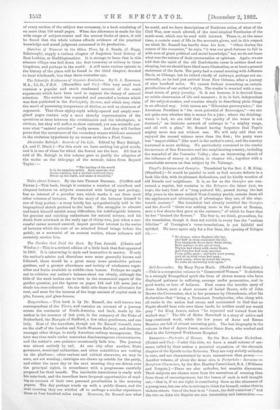Virgil's Eclogues and Georgics. Translated by the Rev. J. M.
King. (Stanford.)—It would bo painful to seek or find minute defects in a book like this, with its pleasant dedications, and its kindly mention of old friends and neighbours. It is, so far as the Georgics are con- cerned, a reprint, but contains in the Eclogues the latest (not, we hope, the last) fruit of a "long pastoral life, passed during the last fifty years in the same retired West-Country parish, remote from all the appliances and advantages, if advantages they are, of the nine- teenth century." The translator had already versified the Georgics and the Aeneid "there was nothing more in the grove at Mantua, save a few shrubs that grew at the entrance," of which he fears that he has "bruised the flowers." The fear is, we think, groundless, for the translation, though it does not exhibit in every line the "curiosa felicities" of Conington's verse-translations, is yet faithful and spirited. We have space only for a few lines, the opening of Eclogue vii.:-
�`
By chance, where Daphnis idly lay, And half iu sleep consumed the day, Two shepherds drove their flocks along, Both masters in the art of son. Thyrsis had sheep with snowy fleece, And Corydon had large increase From milky goats; and both were young, And oft iu rival verse had sung ; Each ready, when he heard the strain, To wake an answering note again."






































 Previous page
Previous page